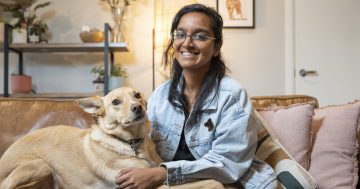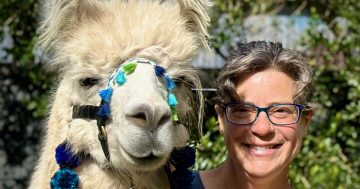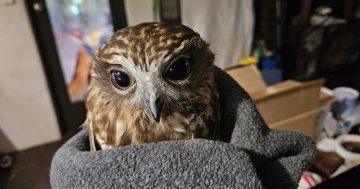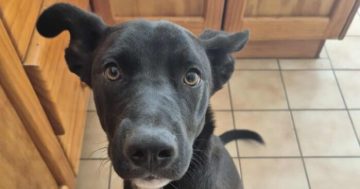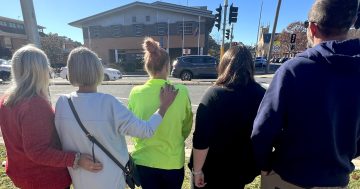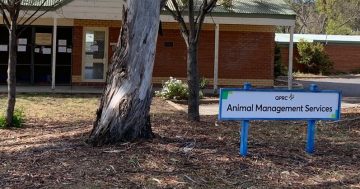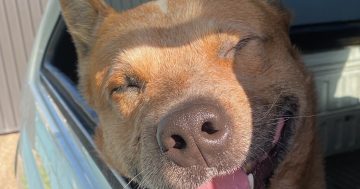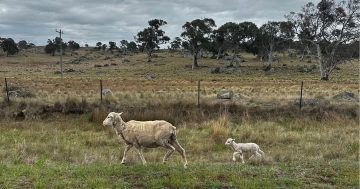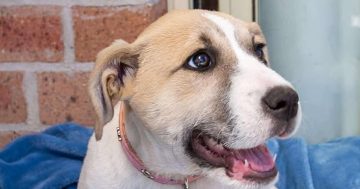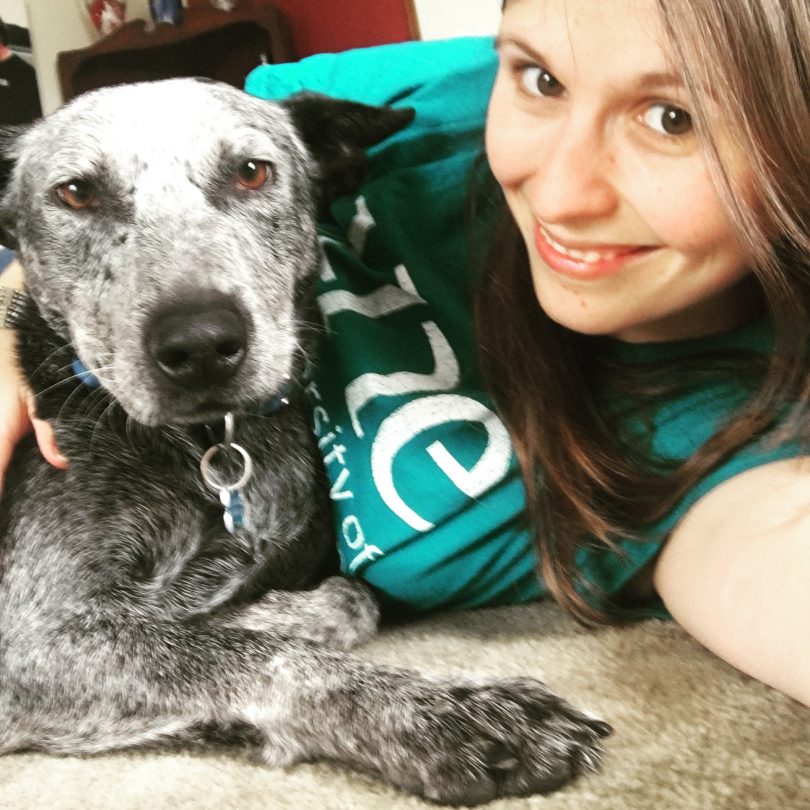
Jade Fountain with one of her greatest success stories, her cattle dog Baloo. Photo: Supplied.
Ever wondered how to explain to your dog – or his mates at the dog park – that a bucket on his head is not a “cone of shame”? Or convince a scared horse that going into a trailer will save her legs. Or even a chicken that knowing how to get into a crate may save its life?
Animal behavioural expert Jade Fountain has spent most of her working life doing so. Brought up in Canberra, she has since moved her business, Animal Behaviour Matters, to the Yass Valley.
In these COVID times, when we are relying more on animals to help reduce loneliness, depression and anxiety, Jade believes it is becoming increasingly important for humans and animals to understand each other.
Jade has always been surrounded by animals.
“I’ve always been inspired by them,” she said.
“I’ve seen the difference they can make to people’s lives – be they dogs, pigs, rabbits, horses.”
She has travelled the world, working with exotic and domestic animals using the same theory – “it’s all a matter of science – and trust”.
One of her own dogs, Baloo – named after that wise old bear from The Jungle Book – is like a second pair of paws around the house. Jade has taught him to fetch drinks from the fridge, and yes, seriously, help load the washing machine.
How? It’s the same method she uses to teach dogs that a cone of shame is actually a cone of fun and that a horse trailer can be as good as a feed trough on wheels.
“All of us, regardless of whether we are animals or humans, operate under the same learning principles. If you provide the right communication, choice, motivation and a trusting relationship with the animal – that’s all you need. You can train an animal to do just about anything.”
Jade’s not interested in circus tricks or putting on a show; rather, the skills she teaches animals – and their humans – are designed to make their lives better and safer.
She also believes it is important to break down stereotypes about animals and what they really need.
“You really don’t need dog bowls anymore,” Jade said. “If you use those dog feeder puzzles, your dog is using its brain and is eating slowly – it is doing what it needs to do for enrichment. It actually takes them back to the days when they had to search around and forage for food.”
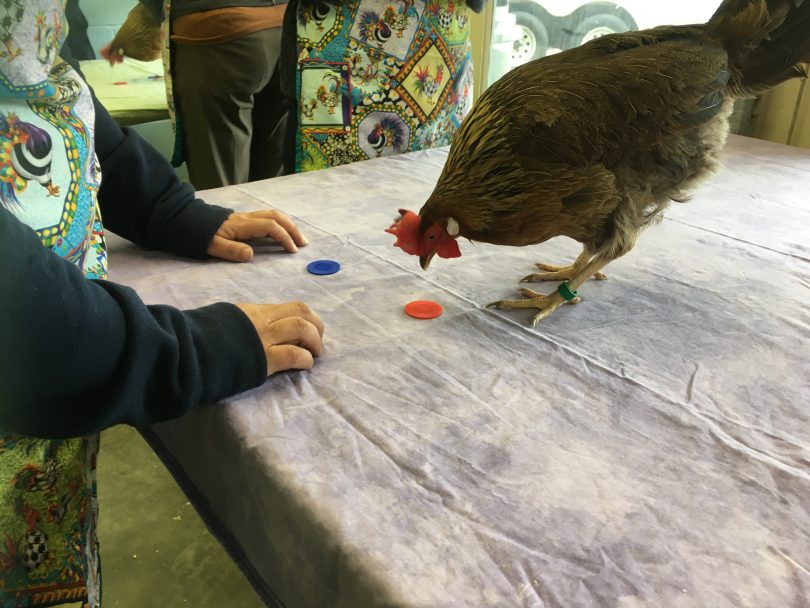
Yes, you can put chickens to the test, according to Jade Fountain. It’s just a matter of positive reinforcement – and a little trust. Photo: Supplied.
Then there are chickens. Who knew you could train them?
“Chickens are actually fabulous learners,” Jade said. “They are very responsive.
“Say you are in a crisis situation, if you can train your chickens to get into a crate, think of how many of their lives you can save in a bushfire. Rather than racing around getting panicked, if chickens have this learned behaviour beforehand, they can quickly get into the crate and be taken away to safety.
“You can also train horses to come when they’re called. Again, imagine how important that is in an emergency situation,” she said. “You can also get them to load onto the float with one cue.
“Getting your horses loaded onto the trailer, especially in a crisis situation, can save lives.
“If a horse has had a bad experience on a float, you have to change that automatic fear response they’ve developed.
“This is where science comes in. The more nervous, the more stressed the horse would be. I use positive reinforcement to remedy that.”
Jade usually goes out to see the horse and owner in person – she now does it via Zoom because of COVID-19, as every case, she says, is different. The visits allow her to assess the horse’s behaviour, the environment and the problems experienced. She will then develop an individual plan for the owner – and horse – to follow, depending on the problems.
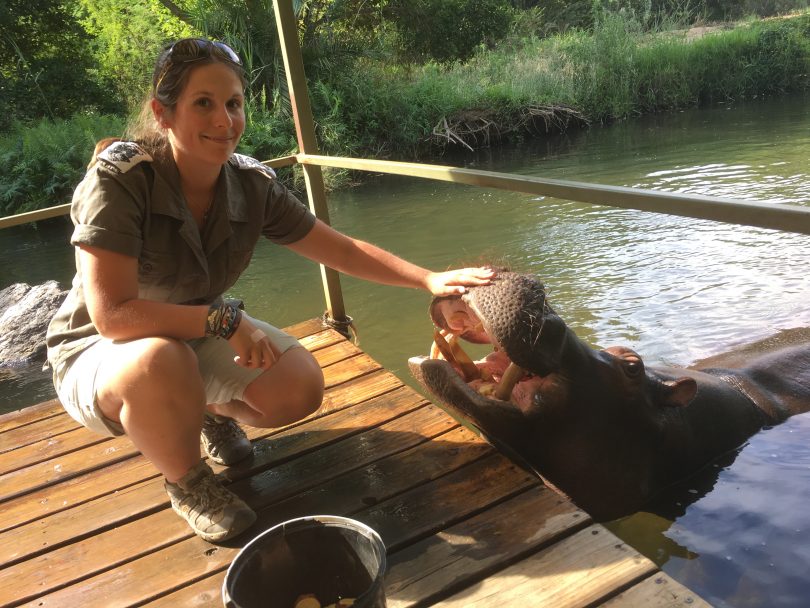
Jade has worked with the most exotic of animals around the world, including the hippopotamus. Photo: Supplied.
Jade also deals with more exotic animals, including the mighty hippo, working in zoos and rehab centres in Australia and overseas.
“In the old days, you had to dart large animals to get injections into them,” she said. “Now, using this training, you can ask an orangutan to present his finger for a blood test.
“These are such exciting developments – you can transfer them to dogs and cats so they don’t mind having their paws handled or nails trimmed.”
Jade believes the greatest need will come when we start to crawl out of the COVID crisis.
“People and animals are going to need more help than they ever have to adjust. I mean, there are animals that have never not known their humans to be with them all the time.’
“We have brought these animals into our lives to be companions. We must do everything we can to give them the best lives.”
Original Article published by Sally Hopman on The RiotACT.







